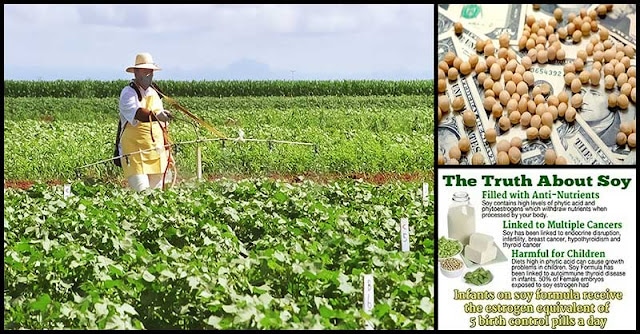The importance of soy to reduce breast cancer has been previously reported by several scientists in both reputable publications and cancer foundations. However, these claims have been contradicted and completely opposed by plenty of research.
In a research conducted at the Memorial Sloan Kettering Cancer Center in New York, scientists warned women that adding soy to their diet will speed up the rate at which breast cancer cells spread.
Unfermented soybeans contain large quantities of natural toxins or “antinutrients”. First among them are potent enzyme inhibitors that block the action of trypsin and other enzymes needed for protein digestion.
During ordinary cooking, these inhibitors are not completely deactivated because they are large and tightly folded proteins. They can produce chronic deficiencies in amino acid uptake, reduced protein digestion, and produce serious gastric distress.
Accelerates The Progression of Breast Cancer
A research conducted at the Memorial Sloan Kettering Cancer Center compared tumor tissues from before and after a 30-day regimen of consuming a soy supplement while a control group took a placebo. According to results, there were changes in the expressions of certain genes that are known to promote cell growth, in those women taking the soy supplement.
The research team concluded that the soy protein could potentially accelerate the progression of the disease.
The study states:
“These data raise concern that soy may exert a stimulating effect on breast cancer in a sub set of women.”
At present, a lot of women are consuming soy with the belief that it can protect them against breast cancer. However, in a research conducted in 1996, it was found that women consuming soy protein isolate had an increased incidence of epithelial hyperplasia, a condition that presages malignancies. After a year, genistein was found to stimulate breast cells to enter the cell cycle. This discovery led the authors to the conclusion that women should not consume soy products to prevent breast cancer.
Kaayla T. Daniel, Ph.D., author of The Whole Soy Story: The Dark Side of America’s Favorite Health Food, says that:
“It’s a myth that soy prevents breast cancer. Numerous studies show that soy can cause, contribute to or even accelerate the growth of cancer.”
Vegans and Vegetarians At Risk
Dr. Jacqueline Bromberg, co-author of the study said that:
“Of the women with high genistein levels, a few of them experienced changes in a specified set of genes that are known to affect breast cancer cell growth, death, or some aspect of breast cancer pathology.”
Those women who consumed around 51.6 grams of soy – the equivalent of about four cups of soy milk a day are the ones who experienced the changes. These brought the researchers into a conclusion that those who eat soy regularly could ‘reasonably consume that amount’ through the course of a day, particularly vegetarians and those who do not eat dairy products.
Those living in Asian countries are warned that they could be especially at risk, due to the presence of high levels of tofu and soy in traditional diets.
Dr. Bromberg further said that:
“We’re not talking about 20 times more soy. We’re talking about something that a person could eat.”
Genetically Modified
If you have found soy or soybean on any product ingredient, it has a 93% chance of being GMO if it is not listed as organic. Yet, organic soy can’t even be trusted as soy is a very problematic crop. At present, those non-organic sources of soy in many agricultural practices are being passed off as organic.
Most Soy is Unfermented
Absorption of protein and four key nutrients (calcium, magnesium, iron, and zinc) are obstructed by phytates in unfermented soy products.
Soybeans, in their natural forms, contain phytochemicals with toxic effects on the human body. The three major anti-nutrients are phytates, enzyme inhibitors, and goitrogens. Through these anti-nutrients, soybean plants are protected so that it can live long enough to effectively reproduce.
Soybean plants are especially rich in anti-nutrient properties, wherein if they are not removed by extensive preparation such as fermentation or soaking, soybeans are one of the worst foods a person can eat.
Most common soy (99%) sold at the grocery retailers are unfermented and it is deadly.
Unfermented soy has been linked to the following conditions:
- Immune system breakdown
- PMS
- Endometriosis,
- Reproductive problems for men and women
- Digestive distress
- ADD and ADHD
- Allergies
- Loss of libido
- High risk of heart disease
- Malnutrition
- Cancer









